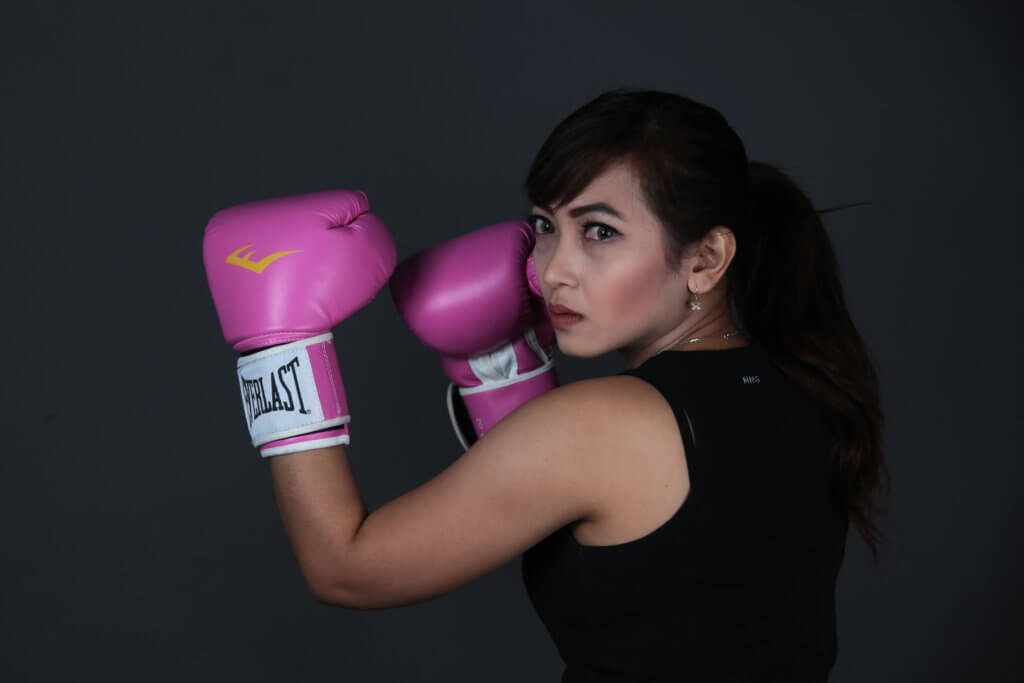Are any jokes off-limits? How to know if you’re punching up vs. punching down

A student in one of our workshops once tried out a joke about wanting to hide a knife in her hijab to cut the boys who tried to take it off.
Can she do that? It’s edgy, but sure.
But could a white dude do a joke about trying to take off a girl’s hijab? NOT RECOMMENDED.
This is all a way of answering the very, very common question: Are any jokes off-limits? The answer is YUP! But the real questions are: Which ones, and how do you figure it out?
Put another way:
Is stabbing people funny? NOT REALLY.
Can you do a joke about stabbing people? MAYBE!
It all depends on your joke, on your intention, and on you.
This is why people talk about punching down versus punching up.
Simply put, punching down means making jokes about people with less power than you. Punching up means making jokes about people with more power than you. When you make fun of a mean principal, you are punching up. When you make fun of the dweeby kid, you are…bullying.
Comedy is better when you punch up.
Punching up is morally preferable, generally kinder, and most likely to make the world a better place, as awesome comic and beloved friend of GOLD Negin Farsad notes. “It’s vital to understand the job comedy can do in actively providing a counterbalance to bigotry and prejudice, as well as understanding the types of humour that reinforce negative stereotypes,” she says. “I want to make sure I’m punching up, not punching down.”
But let’s also look at it simply from the level of craft. A punch line is a surprise. A punch line takes some work. A punch line reveals something new, or says a familiar thing a new way. A punch line may even, at best, not just be a rando wisecrack, but a joke that only YOU can tell: a window into your unique point of view.
So for instance when you make fun of someone short, you’re revealing that they are SHORT—and showing us nothing about what makes YOUR POV unique. When you make fun of the mean principal, you’ve got much more to work with: you can reveal something about how you relate to the grownups who boss you around, and you’ll get people on your side without ganging up. And bonus: no one in the crowd will think, “Eeep, that comic’s kind of mean.”
At the level of craft, it’s lazy to write the easiest joke about the easiest target. Comedy is about being CREATIVE and getting people to LIKE you. Do the harder work on your end and you’ll make easier for them.
Where are your up and down?
Up and down are different for different people. It all depends on how up or down YOU are on the existing power structure (#fighthepower). Straight cis white dude, up. Young woman of color with a hijab, farther down. Let’s call them Norm and Nora. Nora could make jokes about Norm. Norm probably should not make jokes about Nora.
But wait. It’s not really that simple. If Norm makes a joke that puts Nora down for being female, of color, Muslim: that’s punching down. If Norm makes a joke ABOUT sexism, racism, Islamophobia with Nora as his main character: bruh, that’s punching up. Because then he’s making fun of the existing power structure itself. Go, Norm.
#elephantintheroom
Can you make rape jokes? YUP!
Quiz: Will the better jokes be about (a) rape victim(s) or (b) perps and the culture that excuses rape, etc. etc.?
If you answered (b), go write some jokes!
There it is: there is no TOPIC that is off-limits. Not even rape! It’s the joke—the target, the POV, the intention—that requires evaluation.
When in doubt, answer these key questions.
- Who or what is my target? Starting point: make sure the target of your joke—the who or what you are making fun of—has more power than you. (Margin of error: one bratty kid sibling.)
- Who is my audience? Do they have roughly the same up/down as you? You should be good. If not, tread more carefully. (This interesting counterpoint to the up/down idea is relevant here.)
- How’s my tone? YOU KNOW (and so does the crowd) if a joke is coming from a place of snarky mean, or a place of legit anger. (Sometimes legit anger can justify snarky mean, but that’s an advanced move.)
- How’s the joke doing? If it’s crushing with the people you want it to crush with, then you’re probably doing fine. (If it’s crushing with a**holes, maybe let it go.) And if it’s just not working at all, even after some tinkering, it’s just not working. Let go of the idea (usually pushed by people on the higher end of the up/down) that COMEDY IS SUPPOSED TO MAKE PEOPLE UNCOMFORTABLE or whatever. Naw. It’s supposed to make people laugh.
- What does my gut say? How do you feel when you tell this joke? Delighted and energized, or a little tight and squinched up? Your gut knows what’s up. Your gut is a tough crowd, but a good one. If your gut feels off, maybe the joke is, too. If your gut feels good, punch on!
